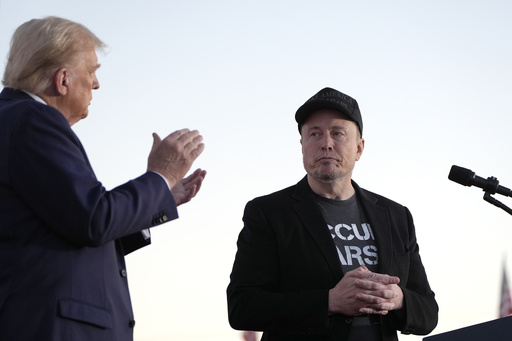A federal judge raised concerns on Monday regarding the authority of Elon Musk and his Department of Government Efficiency (DOGE) during a hearing focused on a request to restrict DOGE’s actions related to sensitive data and employee terminations at various federal agencies.
U.S. District Judge Tanya Chutkan held the session to address a temporary restraining order sought by 14 states aiming to limit Musk’s role in the Trump administration’s efforts to reduce the federal workforce. Judge Chutkan indicated that she would make a decision within a 24-hour timeframe.
Musk was appointed by Trump to head DOGE as part of an initiative to downsize the federal government and eliminate programs viewed unfavorably by the administration. Under this directive, agency heads were advised to prepare for significant workforce cuts, resulting in the dismissal of certain probationary employees following an executive order issued by Trump.
The lawsuit, initiated by Democratic attorneys general from 14 states, criticizes what they describe as Musk’s “unchecked power.” Their aim is to prevent DOGE from terminating employees and accessing sensitive information at the federal Office of Personnel Management, as well as at six other agencies responsible for various domains including health and human services, education, energy, transportation, labor, and commerce.
During the one-hour hearing conducted via Zoom, Judge Chutkan expressed doubt that the states had provided sufficient evidence of immediate harm that would necessitate judicial intervention at this time.
The attorneys general contended that the powers exercised by Musk in his leadership role at DOGE should only be held by an official who has been nominated and confirmed by the Senate, as per constitutional requirements. They also voiced public concerns regarding the secure management of sensitive data. The defense from the federal government argued that DOGE operates in an advisory capacity and does not require Senate approval to access information, further asserting that the states had failed to demonstrate that Musk’s efforts to identify waste and fraud had adversely affected them.
Justice Department lawyer Harry Graver stated, “Nowhere have my friends offered a shred of anything, nor could they, to show that Elon Musk has any formal or actual authority to make any government decision himself.” The judge appeared to challenge this claim, stating, “I think you stretch too far. I disagree with you there,” while noting that these points would ultimately be defined by the merits of the case.
Although Judge Chutkan seemed to doubt the necessity of a temporary restraining order, she expressed understanding for some of the claims made by the states.
In summarizing the plaintiffs’ argument, she remarked, “One of the challenges in plaintiff’s motion is that this is essentially a private citizen directing an organization that’s not a federal agency to have access to the entire workings of the federal government, fire, hire, slash, contract, terminate programs all without apparently any congressional oversight.”
Furthermore, Chutkan pointed out that DOGE appears to be operating in a manner that lacks order or predictability, resulting in uncertainty for the states about impending actions. She requested the Justice Department to provide insights regarding previous and forthcoming employment terminations.
The judge concluded by noting, “DOGE’s actions in this arena have been very unpredictable and scattershot, and I have no idea whether that is by design or simply by virtue of the scope of their remit.”
This website uses cookies so that we can provide you with the best user experience possible. Cookie information is stored in your browser and performs functions such as recognising you when you return to our website and helping our team to understand which sections of the website you find most interesting and useful.
